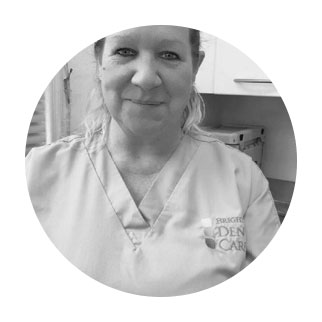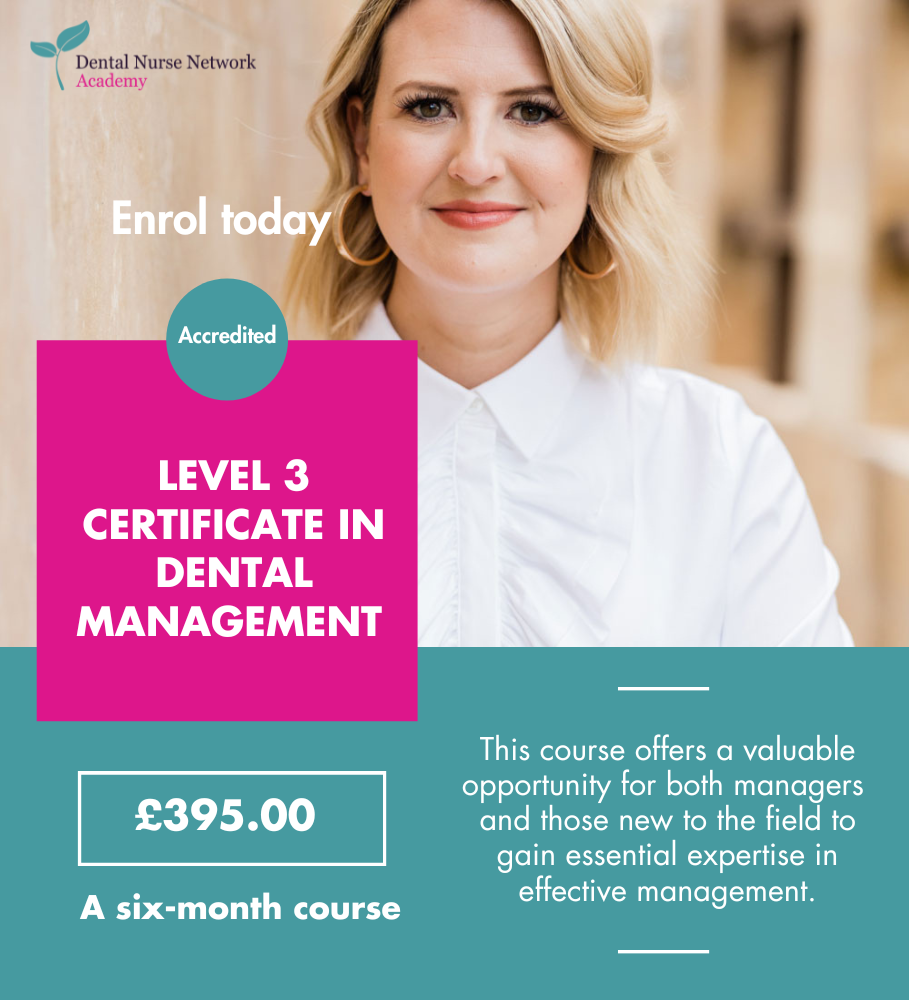 For this month's Inspiration Q&A, we have interviewed Hilary Urry. Hilary completed a degree in dental nursing and was recently awarded a Level 3 assessor award.
For this month's Inspiration Q&A, we have interviewed Hilary Urry. Hilary completed a degree in dental nursing and was recently awarded a Level 3 assessor award.
When did you start working as a dental nurse?
I started dental nursing in 1992 and sat the National Examination in 1994. Back then, the National Examination was optional; many dental nurses chose not to take the examination. When compulsory registration was introduced in 2008 for the General Dental Council, dental nurses who had not taken the National Examination were able to join the register under the ‘grandparenting’ scheme.
Why did you start working as a dental nurse? Was it something you had always wanted to do?
I originally wanted to be a general nurse. I was working in a nursing home as a healthcare assistant, waiting to start my general nursing course, and a patient fell on the floor. I and two colleagues had to lift the patient up; we did not have hoists in those days, so it was all manual handling. On a count of three, we lifted the patient up, and I sustained a serious injury to my knee. As a result, I was advised by my consultant that I would not be able to pursue my dream. My older sister found an advert for a dental nurse in the local paper and suggested that I should apply. My initial thought was: ‘I do not like teeth.’ Anyway, I applied, and nearly twenty-nine years later, I am still working as a dental nurse. Although my main role at the moment is as a practice manager, I still nurse when we are short-staffed.
You are one of the few nurses who have completed a university degree in dental nursing. Can you tell us how you found it? And would you recommend this form of dental nursing training?
The Foundation Degree in Advanced Dental Nursing, run by Health Education England Kent, Surrey and Sussex (HEEKSS) was challenging, especially as I was a mature student when I started (I was forty-seven) and had not undertaken any academic work since leaving school. The course was a two-year course, and they classed it as full-time, even though we only met for eleven weekends, Friday to Sunday, for face-to-face tutorials. The course was split into six different topics over the two years:
Year 1
Lifelong learning and the academic dental nurse;
Microbiology and cross-infection control in the dental workplace;
Year 2
Biomedical science and pharmacology in dentistry;
Topical fluoride application and practical competence;
Oral pathology and oral health education;
Law, ethics and professionalism.
For each topic, we had to produce 3,000- to 10,000-word assignments and PowerPoint presentations.
I found ‘Lifelong learning and the academic dental nurse’ especially challenging, as I was a dental nurse, not an academic. However, as the course progressed, and even now, I realise that everything we do revolves around lifelong learning.
When it came to ‘Microbiology and cross-infection control’, I found that although I was already aware of the hows and whys of the subject, the course went into much more detail and gave me a deeper understanding of the risks of transmission.
‘Biomedical Science and pharmacology’ gave an insight into how different antibiotics work with different oral infections, as well as into other medications that are used in dentistry and why they are used.
‘Topical fluoride’ was a fun topic, as we had phantom heads to practise on initially, and then when we were confident and the tutors were happy, we had to apply fluoride to each other whilst being assessed to ensure that we followed the requirements.
‘Oral pathology and oral health education’ was a really good topic; we covered a lot of detail around the importance of delivering oral health education and also around what to look for when initially carrying out the intra-oral examination on the patient prior to giving the oral health education.
‘Law, ethics and professionalism’ was the one topic that I found difficult to enthuse about, but it was delivered in such a way that it was interesting, and I learnt a lot. I was also able to use the information I gained to change my ethical approach – not just to work but to life in general.
As far as I am aware, HEEKSS are no longer running this course, which is a shame, as I would really recommend it to others. Although as dental nurses we know about all of the topics, this course went into a lot more detail – a little bit like when you start out as a dental nurse and you are learning all the different aspects of the job, and then one day it all falls into place and you understand why you do certain things.
There are dental nursing degrees run by some universities, but these courses seem to be for trainees to get them through their course and be able to register with the GDC rather than for qualified dental nurses.
What other training have you had and what has been the most beneficial to you?
I have the dental nurse radiography certificate, which I passed in 2000. I have had sedation training through SAAD, but this expired this year. I am trained in implant nursing, although I do not hold the NEBDN qualification for this. Since completing my FdSc ADN, I think the lifelong learning teaching has been the most beneficial to me; it has taught me how to reflect, and although this is something we all do daily, it has taken it to another level for me.
Where are you currently working, and has your work changed since the start of the pandemic?
I am currently working in an NHS dental practice as a practice manager. The practice was closed for three months, as were many NHS practices. The way that I work is so different now; I have had to put together the SOPs and train the staff in donning and doffing the enhanced PPE and in enhanced infection control procedures. I have learnt about fallow time and how to arrange the dentist’s diaries to incorporate this. We have gone from 140 patients per day with four dentists and a dental hygienist to eight or nine patients per day per dentist, with only one or maybe two dentists working at a time. The dental hygienist has been back with us for six weeks.
During the lockdown period, I was deployed to a hot hub at our local doctors’ surgery. This was to teach others about infection control. However, the hub did not take off as there were not enough positive cases in our town to warrant running it. I was then deployed to an urgent dental hub and worked there for a few sessions. I found this was really useful for setting up the dental practice where I work ready to reopen Covid secure.
How did you first get into tutoring? What advice would you give to other dental nurses wanting to become a tutor or assessor?
I used to work for a corporate dental company that had its own dental nurse academy, and the company was looking for tutors/markers for the eROEs. I applied and was successful, and I marked/tutored for two years until I left the company. I really enjoyed sharing my knowledge with the student dental nurses, and so when I left, I emailed different training providers, asking if they were looking for tutors/assessors/markers. Two companies responded, one of which was Dental Nurse Network, who I have been with for nearly two years now.
I would advise any dental nurse wishing to become a tutor or assessor to email training providers, and look at taking an assessor’s course as well.
How do you see your career developing?
In the long term, I would like to become a full-time assessor/tutor, either working for myself for different companies, or working with one company.
What advice would you give to nurses wanting to develop their roles?
Believe in yourself. If you want to develop your role, there are many courses out there. They may not seem relevant at the moment, but with talk of NHS Contracts changing to focus more on prevention, this is going to be a great role for dental nurses who have the oral health education qualification, or certificate of competency, and the fluoride application qualification.
In the twenty-nine years that I have been a dental nurse, the role has changed, and we are being given more responsibility. I truly believe that this will only continue to change for the better.


